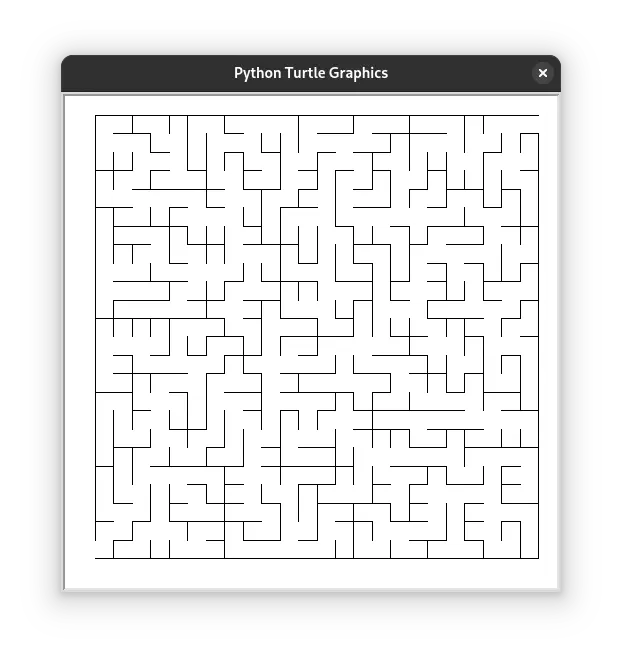I spend a lot of time thinking about problems and solutions. Most of the time, I’m just stumped. Unfortunately, I was never really a programming prodigy. I didn’t start programming when I was 5. I’ve never “dreamt in code”. In most science, engineering, and math contexts, I’m slower than my peers.
I’ve learned not to let these facts bother me. After all, if you’ve solved every problem you’ve ever tried to solve, maybe you should be working on harder problems. Time is the only fundamental scarcity. General consensus says the fact that time is scarce is good reason to be paranoid about how you spend your time. I assert the opposite: The simple act of spending time is just as important and expressive as what you might do during that time.
For a long period of time about a decade ago, I considered how to generate mazes of any size programmatically. I remember thinking about possible solutions for days. I tried a couple ideas in Java and never quite got the results I wanted. This problem haunted me… until I simply moved on. It bested me.
I wonder, if AI had been developed a decade ago, could it have helped me come closer to a solution? The resounding answer from OpenAI, Google, GitHub, Facebook, Nvidia, Elon Musk and friends is, “Yes! AI can help you code better! Our digital assistant can make you 137% more efficient!1” It’s only natural that they would want the rest of us to be excited about AI, considering their stake in the technology.
Efficiency
Let’s assume that AI can, in fact, help me write code of a higher quality in less time than I could alone. Completeness and quality are always good. Efficiency sounds nice, but is it really all that important? After all, not all those who wander are lost. Even if AI lives up to the futuristic promises, is it worth the cost?
AI is often criticized for frequently giving wrong answers. In my own experience, this is absolutely true, but can we really blame it for that? After all, I’ve heard professors, co-workers, and peers make deeply incorrect claims in the same authoritative voice that AI perpetually writes in. Maybe it’s especially frustrating when AI does it because we expect cold, hard computers to be precise and exact, but there are more convincing arguments against AI:
AI training datasets are unregulated by legislature
Thanks especially to the advent of the world wide web, it’s impossible for AI training datasets to be regulated. Models are trained by analyzing a gigantic corpus of text (i.e. the entire web as we know it). Thanks to the open nature of the web, most information can be scraped automatically. There’s no way of knowing whether or not a post you created has ever been or ever will be used to train AI.
Services like Have I Been Trained may be used to prove that your data appears in an AI training dataset, but more needs to be done: It can’t prove that your data doesn’t appear in an AI training dataset. Have I Been Trained also allows users to opt out of allowing their data to be used to train AI, but in practice, nobody actually respects this registry. In the age of AI, your data is not longer yours.
AI training and usage contributes to carbon emissions
The process of training an AI takes a huge amount of computational power. In order to produce their latest model, Grok v3, xAI constructed a supercomputer in Memphis. Ever since the data center’s electrical consumption surpassed the limits of the Memphis power grid, xAI has been using methane gas turbines to fuel their supercomputer. Apparently, xAI intends to use these mobile generators 24/7 permanently.2
Then there are the unpredictable higher-order effects of AI on the environment: Are “anti-woke” AI models like Grok going to impact a large number of people’s views on global warming? Is the broader availability of AI-driven cars going to cause fewer people to use public transit? There’s no way of knowing until it happens.
AI scraperbots are DDoSing the internet
Since the beginning, the web was meant to be a place where anyone could publish their own content, or invent a new service and make it available. It’s as simple as registering a domain, setting up a server daemon, and opening a port on your firewall.
Before search engines like Google, the web was a nebulous, loosely-connected network of documents. Search engines unify the internet by scraping the entire web and indexing its contents. robots.txt exists to inform web scrapers how to index a website.
Since the advent of AI, however, scrapers are no longer interested in indexing websites. They’re interested in downloading the entire contents of every website, to be heaped onto the churning pile of computation that is to produce the latest LLM. These scrapers do not respect robots.txt. The copious amounts of traffic they generate make it even more difficult to host a public-facing service, thus challenging the open nature of the web.3
Real Intelligence
Unlike the bots’, our intelligence isn’t artificial. We’re perfectly capable of finding answers to our own questions and reaching out to each other when we need help. I’m going to try to seek out my own experience and information more, instead of relying on AI. It’s just not worth the costs of outsourcing such a deeply creative labor to math and carbon.
A decade after puzzling over maze generation algorithms, I finally implemented one in Python4. It was written entirely by myself, in an effort to answer a question I had.
Motion, an AI secretary, made this claim when I accessed their homepage February 20, 2025. Your guess as to how their marketing team came up with 137% is as good as mine… ↩︎
See https://www.southernenvironment.org/news/elon-musks-xai-facility-is-polluting-south-memphis/ ↩︎
